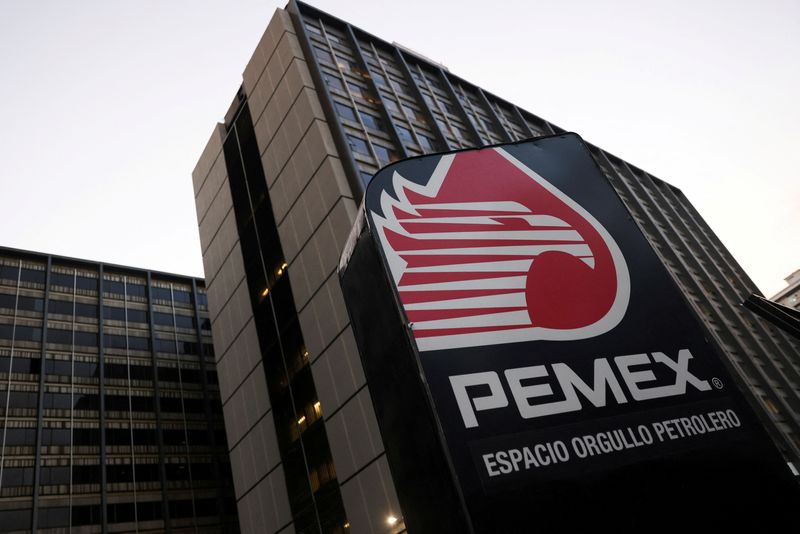Investing.com’s stocks of the week
By Ana Isabel Martinez
MEXICO CITY (Reuters) - Mexico's heavily-indebted state oil company Pemex will seek to avoid pricy capital markets even as it faces billions in maturing debts this year and next, its chief executive told Reuters, saying Pemex had been "punished" by ratings agencies despite measurable improvements in its operational numbers.
With its financial debt totaling nearly $108 billion at the close of last year, Pemex must pay down some $8.2 billion expiring this year and another $9 billion more in 2024 in both bonds and long-term bank loans.
When other liabilities - such as revolving credit lines and interest - are included, Pemex is facing repayments of $24 billion this year, putting the company in a challenging refinancing position.
"We are exploring all (the options)," the company's CEO Octavio Romero said in an interview on Tuesday afternoon at his office in Mexico City, adding that they had not ruled out the possibility of offering potential lenders guarantees backed by crude oil.
Romero's boss, President Andres Manuel Lopez Obrador, has long favored stronger state control over the energy sector, repeatedly pledging to "save" the Mexican oil giant at all costs.
Asked whether Pemex would avoid returning to debt markets after an especially expensive bond issuance in January, he responded: "Yes, yes, we are going to try to find the best, cheapest mechanism."
Romero said he hopes Pemex will not have to ask for more help from state coffers - but he did not rule it out.
"That is the great benefit of two very important government entities working hand-in-hand," he said, referring to the finance ministry and Pemex, Mexico's biggest company and largest contributer to state revenues.
Romero hit back at credit rating agencies that have "punished" Pemex by declaring its bonds speculative grade, or junk, which made its borrowing more expensive. He said the agencies were ignoring progress made by current management on boosting production, lowering debt and keeping reserves stable.
In 2020, Fitch Ratings and Moody's (NYSE:MCO) Investors Service became the first two major ratings agencies to strip Pemex of its investment grade status, with the latter pushing it deeper into speculative grade last year.
Moody's, Standard & Poor's and Fitch Ratings all declined immediate comment.
Though Pemex has shaved off some of its debt under new management amid high oil prices, it made a meager profit of about $1.2 billion last year, despite the oil boom boosting its income by 60% to $123 billion. Much of it was eaten up by high costs including the purchase of petroleum products for resale, financial costs, taxes and fees.
CLIPPED OIL AMBITIONS
After years of often massive losses, Pemex's recent uptick in profitability came as private oil majors such as U.S.-based Chevron Corp (NYSE:CVX) and France's TotalEnergies raked in record gains.
At the end of January, Pemex issued 10-year bonds worth $2 billion at a 10.375% interest rate on the market to refinance some debt.
In doing so, it avoided tapping the government lifeline again, which has provided the company with some $45 billion between capital injections and tax benefits over the last four years.
Pemex now forecasts that by early 2024 it will boost crude and condensate output to 2.0 million barrels per day (bpd), from 1.69 million bpd in 2022.
That production target significantly scales back Lopez Obrador's initial oil ambitions, when in late 2018 at the start of his administration he promised to grow Pemex production to 2.6 million bpd.
Romero, a long-time Lopez Obrador confidant who had no prior oil industry experience prior to taking the helm at Pemex, said the goal will be reached with the 37 oil fields developed since 2019.
Those projects have contributed some 507,000 bpd while partly offseting the natural decline of the company's biggest, aging fields.
"The increase that we've already had ... is due to the fact that we already have a large part of the infrastructure completed," he said.
The Pemex chief said he also sees the company making a profit this year with an expectation that Mexican crude averages at least $70 a barrel.
Pumping more, he said, "will comfortably allow us to meet our country's demand for crude oil and fuels."
